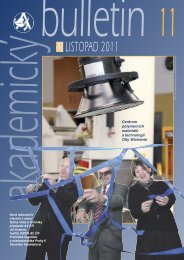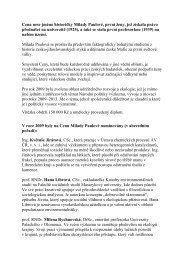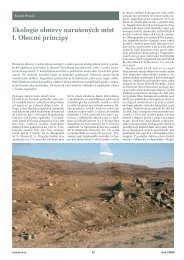vÄda a výzkum - Akademický bulletin - Akademie vÄd ÄR
vÄda a výzkum - Akademický bulletin - Akademie vÄd ÄR
vÄda a výzkum - Akademický bulletin - Akademie vÄd ÄR
Create successful ePaper yourself
Turn your PDF publications into a flip-book with our unique Google optimized e-Paper software.
FOTO: STANISLAVA KYSELOVÁ, AKADEMICKÝ BULLETIN<br />
r e s u m é<br />
The model<br />
of the Armillary<br />
sphere<br />
by Jan Felkl,<br />
Roztoky,<br />
Bohemia,<br />
turn of 19 th<br />
and 20 th century.<br />
TOPIC OF THE MONTH<br />
‘I am putting out a fire instead of doing my job’<br />
In this issue, we feature an interview with the president<br />
of the Academy of Sciences of the Czech<br />
Republic (AS CR), Prof. Jiří Drahoš. The interview<br />
focuses on funding science and research at AS CR<br />
and the methodology that has become the universal<br />
tool for distributing money to the whole Czech science<br />
as a whole. On the basis of this government-<br />
-conceived tool, the institutional financial grant for<br />
the AS CR should be reduced by about 50 percent<br />
by 2012.<br />
EVENT<br />
Apollo 40 th Anniversary<br />
Forty years ago, the first person set his foot on<br />
the surface of the Moon. Astronaut Neil Armstrong<br />
made the first step on the Moon from Apollo 11’s<br />
landing craft designated named the Eagle on July 20,<br />
1969. He summed up this monumental event with his<br />
well-known prediction: “That is one small step for [a]<br />
man; one giant leap for mankind”. The moon landing is<br />
seen as the highest point of U.S. space program<br />
motivated by a long-running space race with the<br />
former Soviet Union. Twelve years before the Apollo 11<br />
mission, the Soviet Union launched the first satellite<br />
into the Earth’s orbit.<br />
SCIENCE AND RESEARCH<br />
17 th International Conference on Computing in<br />
High Energy and Nuclear Physics (CHEP 2009)<br />
The topmost meeting of experts in the area of<br />
nuclear physics and elementary particle physics,<br />
took place in Prague March 21–27, 2009. It provided<br />
an international science forum for exchanging information<br />
on computing experience and needs for the High<br />
akademický<strong>bulletin</strong><br />
ab<br />
36<br />
Energy and Nuclear Physics communities, and also<br />
reviewed recent, ongoing and future activities.<br />
CHEP conferences are held in 18-month intervals<br />
(the last conference was held in Canada 2007).<br />
Nuclear physics and elementary particle physics<br />
(called high-energy physics today) represent branches<br />
that are also crucial for development in the area<br />
of computers and data processing. For example, it is<br />
particle physics that is credited for the emergence<br />
of the World Wide Web.<br />
POPULARIZATION<br />
Discovering science while being onboard,<br />
an Exhibition Future<br />
A mobile exhibition, German Science Train, which<br />
is organized by the Max Planck Society as part of<br />
the Year of Science 2009, takes the public on a research<br />
voyage! The idea is to show different aspects<br />
of science with an eye to the future. In 12 converted<br />
train cars, visitors can dive into different subjects:<br />
from cosmology to particle physics, nanotechnology<br />
and brain research to applied and industrial research<br />
in production, agriculture, energy, environment and<br />
mobility. The exhibition is making stops throughout<br />
Germany until December.<br />
FROM BRUSSELS<br />
The Swedish EU Presidency<br />
Sweden assumed the European Union six-month<br />
rotating presidency from the Czech Republic on 1 July<br />
2009. Under the motto “Taking on the challenges”,<br />
Sweden has taken charge of the EU administration in<br />
difficult times of economic recession and faces an<br />
uncertain institutional future. The Swedish government<br />
has defined the aims of its EU presidency as:<br />
conducting an effective, open and results-oriented<br />
presidency in the interests of the whole of Europe;<br />
advancing the EU’s common issues and Sweden’s<br />
priority issues; strengthening Sweden’s role in the EU,<br />
serving in the EU's interest and strengthening<br />
the EU’s role as a global actor in issues, such as<br />
climate changing and CO 2 tax.<br />
ANNIVERSARY<br />
400 th Anniversary of Kepler’s Astronomia Nova<br />
The International Year of Astronomy 2009 (IYA2009)<br />
celebrates not only Galileo Galilei’s innovative work<br />
in telescopic observational astronomy, but also the<br />
year that Johannes Kepler’s paradigm-setting work<br />
Astronomia Nova – which he wrote in Prague – was<br />
published. This, Kepler’s magnum opus contains<br />
the results of the astronomer’s ten year investigation<br />
of the motion of Mars and records the discovery of<br />
the first two of the three principles known as Kepler’s<br />
Laws of Planetary Motion.
















